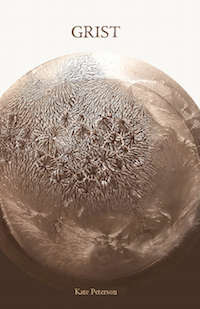
Grist by Kate Peterson (Floating Bridge Press, 2016)
Reviewed by Rebecca Valley
During my freshman year at Bennington College, a dance professor making a desperate attempt to teach us about our own bodies described the skeletal system as the scaffolding on which the body is built. She told us that often, in the study of anatomy, students discover a favorite system, one that they relate to most closely. In this anatomical personality test, I wasn’t invested in the names of folded muscle, the bundled, sensitive nerves, the rivers and tributaries of the circulatory system. Like Kate Peterson, I was a woman interested in bones.
Kate Peterson’s chapbook Grist, published by Floating Bridge Press earlier this year, is a book about crumbling foundations. It begins with damaged body, but by the end of the book it has wound its way through the loss of a parent, a baby, a house, another woman’s child. In the title poem of the book, Peterson writes about the replacement of a hipbone, and the complications that come with illness. She says:
“That first time, I imagined my bones healing
into calcified hands that would keep
my spine from slipping.”
Later, after her “body rejected its own / bits, ground and spit them up,” she writes about the fragility of health when she slides on ice, as if at any moment her body would collapse in on itself, leaving her a painful heap on the ground.
This theme of being suddenly upended runs through many of Peterson’s poems. In “Upon Finding Out I Miscarried Our Child While Flying Over Lake Michigan,” – arguably the most beautiful and haunting poem in the collection – Peterson writes: “you mistook my womb for someplace safe / not some red wet grave,” another moment in which what is most familiar to the speaker, her own body, becomes traitorous and unreliable. This is where Grist‘s strength lies, in this de-familiarization – this book is physical, visceral, like the doctors who “scratched [the speaker’s bones]… until blood came up.” In this collection, Peterson seems to be scratching at those same wounds, pulling back the skin to see what she can uncover. In this way, she takes what little control she can — over her body, her family, her place in the world.
Though at moments this collection feels fragile, like it is teetering on the edge of collapse, Grist is as much a book about healing as it is about being wounded. Many of the poems take place in hospital beds, where you can almost feel the bones of the speaker’s body knitting themselves, slowly, back together. The final words of the collection ring out, beyond the scrape of a scalpel against bone or a dead sparrow in the fireplace, toward a cynical, but certain hopefulness:
“Sometimes things get broken, she said. Sometimes a car wrecks
on the side of the road and your father sees it and says to you,
My god, be careful out here.
And you try. You try for as long as you can.”
Buy this book: Floating Bridge Press

One thought on “Local Forecast: Grist by Kate Peterson”